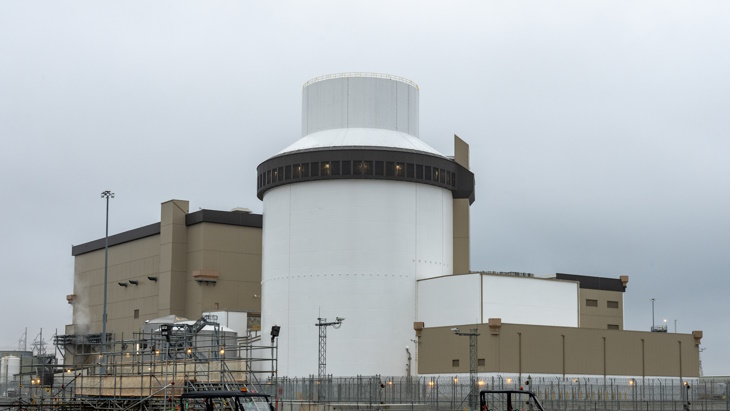Vogtle 3 reaches first criticality
Georgia Power has announced that the AP1000 - the first new nuclear unit to be built in the USA in more than three decades - has safely reached initial criticality.

Vogtle 3 pictured in February (Image: Georgia Power)
Initial criticality means that the nuclear fission reaction in the reactor is now self-sustaining, meaning the reactor can begin producing heat that will be used to make steam to produce electricity.
The reactor's power output will now be raised to prepare it for synchronisation to the electric grid, and the start of electricity generation. Operators will then take the unit through a gradual power increase until it reaches its full power output. Tests to ensure all systems are operating together and to validate operating procedures will be carried out throughout the start-up process before the unit is declared to be in commercial operation. Georgia Power currently projects an in-service date for Vogtle 3 in May or June.
Two Westinghouse AP1000 units are being built at the Vogtle site near Waynesboro in Georgia, which is already home to two operating pressurised water reactors. Georgia Power President and CEO Chris Womack said the company remains focused on bringing the unit online safely. Initial criticality is one of the final steps in the startup process and has required "tremendous diligence and attention to detail" from the teams involved, he said.
"When you consider the history of safe and reliable operations at Vogtle Units 1 and 2 for decades now, it puts today’s milestone in perspective that Plant Vogtle will be a four-unit site making it the largest of its kind in the US. This is a truly exciting time as we prepare to bring online a new nuclear unit that will serve our state with clean and emission-free energy for the next 60 to 80 years," he said.
The last reactor to start up in the USA before Vogtle 3 was Watts Bar unit 2, in 2016. Construction of that reactor began in 1973 and was suspended in 1985 before work resumed in 2007.
Construction of the two AP1000s - so-called Generation III+ reactors with fully passive safety systems and a modular construction design - began at Vogtle in 2013, with work starting on unit 3 in March and unit 4 in November of that year. Southern Nuclear and Georgia Power, both subsidiaries of Southern Company, took over management of the construction project in 2017 following Westinghouse's Chapter 11 bankruptcy. A strategic partnership of Cameco Corporation and Brookfield Renewable Partners is currently in the process of acquiring Westinghouse in a transaction expected to close before the end of this year.
"We are honoured to share this incredible moment with Southern Nuclear, Georgia Power and the project's co-owners, and with the entire team at Vogtle," Westinghouse President and CEO Patrick Fragman said. "This is a significant step toward delivering clean, reliable and safe power to the people of Georgia for generations to come."
The units are co-owned by Georgia Power, Oglethorpe Power, MEAG Power and Dalton Utilities, and will be operated by Southern Nuclear. Unit 4 is currently expected to enter service before the end of the first quarter of 2024.
Four AP1000 units are in operation in China with four more under construction, and two more planned. The design has also selected by Poland for its nuclear energy programme and is being considered for deployment in countries including Bulgaria and Ukraine.
"Vogtle 3 will soon be supplying clean electricity to millions of people in Georgia," World Nuclear Association Director General Sama Bilbao y León commented. "Congratulations to all those who have worked so hard to deliver this project. Now, the pace of new nuclear construction must accelerate globally to meet decarbonisation goals and ensure energy security."
Researched and written by World Nuclear News
- China Institute of Atomic Energy
- Nuclear Power Institute of China
- Southwestern Institute of Physics
- China Nuclear Power Operation Technology Corporation, Ltd.
- China Nuclear Power Engineering Co., Ltd.
- China Institute for Radiation Protection
- Beijing Research Institute of Uranium Geology (BRIUG)
- China Institute of Nuclear Industry Strategy (CINIS)
- China Nuclear Mining Science and Technology Corporation


